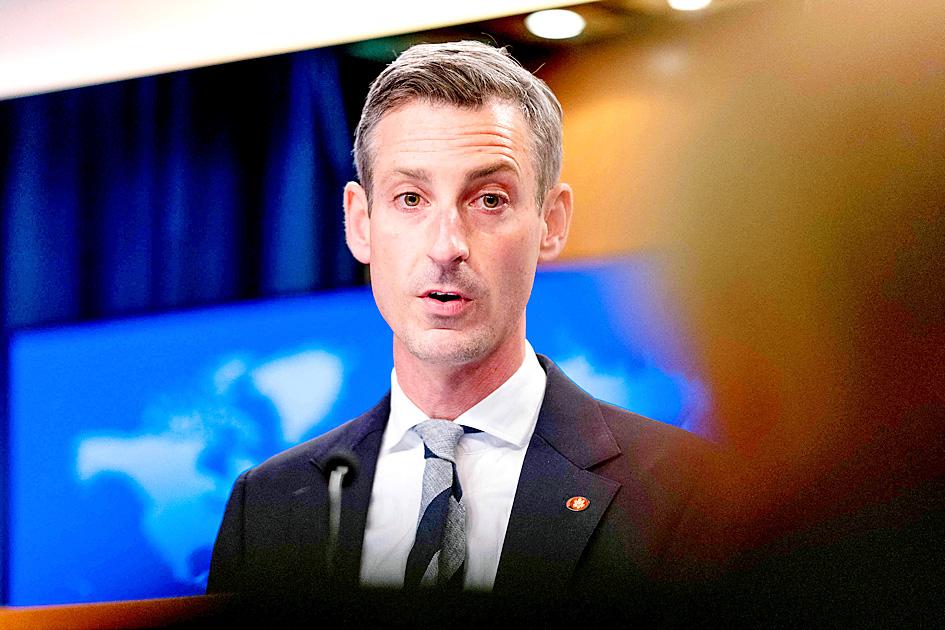The US Department of State yesterday criticized Beijing over its misrepresentation of the US’ “one China” policy in the latest diplomatic salvo between the two countries over a bid by Taiwan to regain its observer status at the World Health Assembly, the decisionmaking body of the WHO.
“The PRC [People’s Republic of China] continues to publicly misrepresent U.S. policy,” Department of State spokesman Ned Price wrote on Twitter.
“The United States does not subscribe to the PRC’s ‘one China principle’ — we remain committed to our longstanding, bipartisan one China policy, guided by the Taiwan Relations Act, Three Joint Communiques, and Six Assurances,” he added.

Photo: AFP
Price’s comments came three days after Chinese Ministry of Foreign Affairs spokesman Zhao Lijian (趙立堅) expressed Beijing’s displeasure at Washington’s stance, saying: “The US’ latest modification of the fact sheet is a trick to obscure and hollow out the one China principle.”
“Such political manipulation of the Taiwan question and the attempt to change the status quo across the Taiwan Strait will hurt the US itself,” he told a routine news conference in Beijing.
Zhao was referring to a change to the department’s fact sheet on Taiwan that removed statements that Washington acknowledged Beijing’s “one China” position and did not support Taiwanese independence.
On Sunday last week, US President Joe Biden signed into law bill S.812 to stipulate that Washington must develop a plan to back Taiwan’s bid to take part in the WHO and other international organizations.
The legislation — which passed the US Congress with bipartisan support — lauded Taiwan as “a model contributor to world health, having provided financial and technical assistance to respond to numerous global health challenges.”
Taiwan has yet to receive an invitation to this year’s WHA, which is to be held from today to Saturday next week in Geneva, Switzerland.
The US long maintained that its “one China” policy is distinct from Beijing’s “principle” in that China asserts sovereignty over Taiwan, while Washington takes no position on the issue, David Stilwell, assistant secretary of state for East Asian and Pacific affairs, told a US-based think tank in September 2020.
Washington’s interest is that “the Taiwan question be resolved peacefully, without coercion and in a manner acceptable to the people on both sides of the [Taiwan] Strait,” he said, adding that the US has “a commitment to assist Taiwan in its self-defense” in accordance with the Taiwan Relations Act.

A magnitude 5.6 earthquake struck off the coast of Yilan County at 12:37pm today, with clear shaking felt across much of northern Taiwan. There were no immediate reports of damage. The epicenter of the quake was 16.9km east-southeast of Yilan County Hall offshore at a depth of 66.8km, Central Weather Administration (CWA) data showed. The maximum intensity registered at a 4 in Yilan County’s Nanao Township (南澳) on Taiwan’s seven-tier scale. Other parts of Yilan, as well as certain areas of Hualien County, Taipei, New Taipei City, Taoyuan, Hsinchu County, Taichung and Miaoli County, recorded intensities of 3. Residents of Yilan County and Taipei received

Taiwan has secured another breakthrough in fruit exports, with jujubes, dragon fruit and lychees approved for shipment to the EU, the Ministry of Agriculture said yesterday. The Animal and Plant Health Inspection Agency on Thursday received formal notification of the approval from the EU, the ministry said, adding that the decision was expected to expand Taiwanese fruit producers’ access to high-end European markets. Taiwan exported 126 tonnes of lychees last year, valued at US$1.48 million, with Japan accounting for 102 tonnes. Other export destinations included New Zealand, Hong Kong, the US and Australia, ministry data showed. Jujube exports totaled 103 tonnes, valued at

BIG SPENDERS: Foreign investors bought the most Taiwan equities since 2005, signaling confidence that an AI boom would continue to benefit chipmakers Taiwan Semiconductor Manufacturing Co’s (TSMC, 台積電) market capitalization swelled to US$2 trillion for the first time following a 4.25 percent rally in its American depositary receipts (ADR) overnight, putting the world’s biggest contract chipmaker sixth on the list of the world’s biggest companies by market capitalization, just behind Amazon.com Inc. The site CompaniesMarketcap.com ranked TSMC ahead of Saudi Aramco and Meta Platforms Inc. The Taiwanese company’s ADRs on Tuesday surged to US$385.75 on the New York Stock Exchange, as strong demand for artificial intelligence (AI) applications led to chip supply constraints and boost revenue growth to record-breaking levels. Each TSMC ADR represents

TRUST: The KMT said it respected the US’ timing and considerations, and hoped it would continue to honor its commitments to helping Taiwan bolster its defenses and deterrence US President Donald Trump is delaying a multibillion-dollar arms sale to Taiwan to ensure his visit to Beijing is successful, a New York Times report said. The weapons sales package has stalled in the US Department of State, the report said, citing US officials it did not identify. The White House has told agencies not to push forward ahead of Trump’s meeting with Chinese President Xi Jinping (習近平), it said. The two last month held a phone call to discuss trade and geopolitical flashpoints ahead of the summit. Xi raised the Taiwan issue and urged the US to handle arms sales to